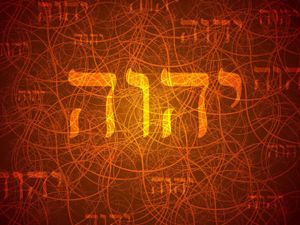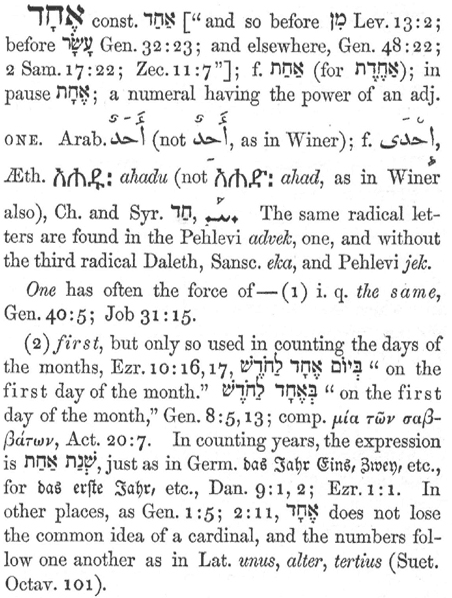
Sh’ma Yisra’el YHWH eloheinu YHWH echad.
Listen Israel! YHWH your God, YHWH is one.
This verse, Deuteronomy 6:4 is the central creed of Judaism and the most important commandment according to our Messiah Yeshua (Jesus Christ) (Read Mark 12:28-29). There has been a great deal of controversy surrounding this verse ever since the Binity (later the Trinity) became the accepted Christology in Christendom in the 3rd century AD.
The point of contention is the Hebrew word echad. Binitarians, Trinitarians and Modalists alike argue that the Hebrew word echad, in this immediate context, denotes a “uni-plurality” (multiple personas in one entity), but is this truth or merely biased assumption? For clarity’s sake, we will examine the hundreds of occurrences of echad in the Torah (around 400 in all) and the many ways they are used in the Hebrew text.
This is what we read in the entry for echad found in Genesius’ Hebrew and Chaldee Lexicon:



Below you will find listed and will be given a link to every verse in the Torah that contains the word echad. Each verse is color coded to match its function and usage in the Hebrew text. Since the numerical usages of echad are vast and self-explanatory, we will be focusing primarily on the few verses left to interpretation by Binitarians, Trinitarians and Modalists.
Legend:
▉ Echad as an ordinal
▉ Echad as a numeral
▉ Echad as a unity
▉ Questionable
Genesis 1:5, 9, 2:11, 21, 24, 3:22, 4:19, 8:5, 13, 10:25, 11:1, 6, 19:9, 21:15, 22:2, 26:10, 27:38, 44-45, 29:20, 32:8, 22, 33:13, 34:16, 22, 37:9, 20, 40:5, 41:5, 11, 22, 25-26, 42:11, 13, 16, 19, 27, 32-33, 44:28, 48:22, 49:16.
Exodus 1:15, 8:31, 9:6-7, 10:19, 11:1, 12:18, 46, 49, 14:28, 16:22, 33, 17:12, 18:3-4, 23:29, 24:3, 25:12, 19, 32-33, 36, 26:2, 4-6, 8, 10-11, 16-17, 19, 21, 24-26, 27:9, 28:10, 17, 29:1, 3, 15, 23, 39-40, 30:10, 33:5, 36:9-13, 15, 18, 21-22, 24, 26, 29-31, 37:3, 8, 18-19, 22, 39:10, 40:2, 17.
Leviticus 4:2, 13, 22, 27, 5:4-5, 7, 13, 17, 6:3, 7, 7:7, 14, 8:26, 12:8, 13:2, 14:5, 10, 12, 21-22, 30-31, 50, 15:15, 30, 16:5, 8, 34, 22:28, 23:18-19, 24, 24:5, 22, 48, 26:26.
Numbers 1:1, 18, 41, 44, 2:16, 28, 6:11, 14, 19, 7:3, 11, 13-16, 19-22, 25-28, 31-34, 37-40, 43-46, 49-52, 55-58, 61-64, 67-70, 73-76, 79-82, 85, 8:12, 9:14, 10:4, 11:19, 26, 13:2, 23, 14:15, 15:5, 11-12, 15-16, 24, 27, 29, 16:15, 22, 17:3, 6, 28:4, 7, 11-13, 15, 19, 21-22, 27-30, 29:1-2, 4-5, 8-11, 14-16, 19, 22, 25, 28, 31, 34, 36, 38, 31:28, 30, 34, 39, 47, 33:38, 34:18, 35:30, 36:3, 8.
Deuteronomy 1:2-3, 23, 4:42, 6:4, 12:14, 13:12, 15:7, 16:5, 17:2, 6, 18:6, 19:5, 11, 15, 21:15, 23:16, 24:5, 25:5, 11, 28:7, 25, 55, 32:30.
Each one of the verses listed in blue uses echad as the numeral one or eleven (one + ten), so there’s no point in splitting hairs over them. Similarly, the green verses use echad as the ordinal one (i.e., first), which cannot possibly denote a unity. The orange verses use echad ambiguously, while the red verses clearly denote a unified whole; these last two groups will be the subject of our investigation.
Genesis 2:24
So, as we see, there is no other Elohim (Mighty One) aside from YHWH. He is the only true Elohim, aside from him there is no other. Notice the constant usage of singular pronouns (I, he, him, me). YHWH only refers to himself in plural pronouns when he is speaking to his malakhim (angels) (Genesis 1:26, 3:22, 11:7; Isaiah 6:8), every other time (about 20,000 times) he refers to himself in singular pronouns. And the reason for it is that he is one and ONLY one. That is the plain and simple reading of the text. Other explanations have to bypass the text and ignore the grammar altogether.
Genesis 29:14, Judges 9:2, and 2 Samuel 19:12 all use basar (בשר) to mean one’s kindred or flesh and bone. The Trinitarian assumption is that if man and woman are echad in marriage, therefore three beings can all be echad, yet still maintain independently the attributes of each being “fully God” without being three gods.
The problem with this line of reasoning is that man and woman, though echad in purpose, are still two separate beings. A husband is not his wife and vice-versa. Husband and wife are neither “co-equal” nor “co-eternal”. They are one family. A man and woman come together to make a child, which is their flesh and bone.
Genesis 11:1
What do we know from this verse? At one point in time everyone spoke the same language, not a “uni-plurality” of languages. Otherwise, verse 7 makes no sense. You simply can’t confuse their language if they speak different languages.
Genesis 11:6
Here YHWH is speaking to his malakhim (messengers or angels) about those building the tower at Babel. The people are am echad(one people) united in purpose and are of shaphah achat (one lip), meaning that they speak one language, not a unified multiplicity of languages. Therefore, YHWH says to his malakhim in the next verse: “Come, let us go down, and there confuse their language”. They spoke one singular language. There are some who would use the “us” of verse 7 to support a belief in a “uni-plural Godhead,” when it is instead a majestic plural.
Genesis 27:44
Here again echad has the masculine plural imsuffix. Contrary to popular belief, this does not make echad plural. Once again, this is a majestic plural; a numerically plural noun receives a plural suffix, verb, and adjective. Since yom (day) in this verse is in the plural form and echad (one) modifies yamim, therefore echadmust take on the plural suffix.
Genesis 29:20
The same principle holds true for this verse. Echadim(ones) is modifying k‘yamim (as-days); As Gesenius noted: This grammatical structure is equivalent to “a few days”. A grammatically plural adjective is modifying a plural noun.
Genesis 34:16
After Shechem the Hivite raped Jacob’s daughter Dinah (Genesis 34:1-2), the sons of Jacob deceitfully agreed to a treaty of sorts with S’khem and his people (Genesis 34:13-16); that, if they would all receive circumcision then Jacob and his people would dwell therein with Shechem and become l’am echad (one people). In context, this is not a “uni-plurality”, rather numerically one (Genesis 34:20-23). In layman’s terms, they would assimilate into one another, making a new nation.
Exodus 24:3
This is one of only three times in the Torah that echadis unambiguously used as a unified whole. However, it does not indicate a literal unity in persons, rather a unity in voice. For, “all the people answered with one voice, and said, ‘All the words which YHWH has spoken we will do’ ”. Each person had their own mouth and their own tongue, and they were not speaking with one mouth and one tongue.
Exodus 26:11
YHWH commands Moses to make fifty bronze clasps, to put the clasps into the loops, and to “couple the tent together that it may be one.” This is clearly not a quantity, rather a literal unified whole. Although it is not “uni-plural”, because the two curtains are to literally become one giant, interconnected curtain.
Deuteronomy 6:4
Finally, we come to the central verse for which this word study revolves around. The question is, does the word echad leave room for a “uni-plurality” or should we understand it to be an absolute singularity? Seeing that only 3 of about 300 or more verses in Torah clearly denote a unity, it would no doubt be a stretch of imagination to believe this echadto mean a “uni-plurality”, much less a trinity.
In fact, there is a great number of verses from the Tanakh that show the clear, absolute, and indisputable singularity of YHWH:
Deuteronomy 32:12
Literally: YHWH alone he-is-guiding-him and-there-is-no with-him El-of foreigner.
Deuteronomy 32:39
Literally: see-you! now that I, I he and-there-is-no Elohim with-me I, I-am-putting-to-death and-I-am-making-alive I-transfixed and-I, I-shall-heal and-there-is-no from-hand-of-me one-rescuing.
2 Kings 19:19
Literally: and-now YHWH Elohim-of-us save-you-us! please! from-hand-of-him and-they-shall-know all-of kingdoms-of the-earth that you YHWH Elohim to-alone-of-you.
Isaiah 43:10-11
Literally: you witnesses-of-me averment-of YHWH and-servant-of-me whom I-choose so-that you-shall-know and-you-shall-believe to-me and-you-shall-understand that I he to-faces-of-me not he-was-formed El and-after-me not he-shall become. I, I YHWH and-there-is-no from-apart-from-me one-saving.
Isaiah 44:6,8
Literally: thus he-says YHWH king-of Israel and-one-redeeming-of-him YHWH-of hosts I first and-I last and-from-apart-from-me there-is-no Elohim. Must-not-be you-are-being-afraid and-must-not-be you-are-fearing ?-not from-then I-announced-you and-I-told and-you witnesses-of-me ?-there-is Eloah from-apart-from-me and-there-is-no rock no I-know.
Isaiah 45:21-22
Literally: tell-you! and-bring-close-you! indeed they-shall-be-consulted together who-? he-announced this from-aforetime from-then he-told-her ?-not I YHWH and-there-is-no further Elohim from-apart-from-me El righteous and-one-saving there-is-no except-me. Face-about-you! to-me and-be-saved-you! all-of limits-of earth that I El and-there-is-no further.
Hosea 13:4
Literally: And-I YHWH Elohim-of-you from-land-of Egypt and-Elohim except-me not you-shall-know and-one-saving there-is-no unless-I.
Malachi 2:10
Literally: ?-not father one to-all-of-us ?-not El one he-created-us for-what-reason we-are-being-treacherous man in-brother-of-him to-to-profane-of covenant-of fathers-of-us.
So, as we see, there is no other Elohim (Mighty One) aside from YHWH. He is the only true Elohim, aside from him there is no other. Notice the constant usage of singular pronouns (I, he, him, me). YHWH only refers to himself in plural pronouns when he is speaking to his malakhim (angels) (Genesis 1:26, 3:22, 11:7; Isaiah 6:8), every other time (about 20,000 times) he refers to himself in singular pronouns. And the reason for it is that he is one and ONLY one. That is the plain and simple reading of the text. Other explanations have to bypass the text and ignore the grammar altogether.





